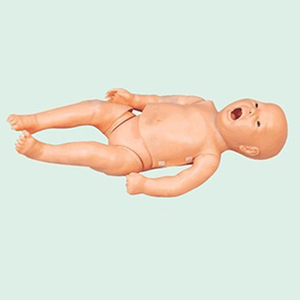With the continuous development of medical education and clinical training technology, advanced infant simulators are playing an increasingly important role in improving the quality of nursing care. As a high-end medical simulation tool, the Infant Advanced Simulator provides a safe and controllable training platform by simulating real physiological responses and pathological states, helping caregivers improve their professional skills, respond to emergencies, and improve the overall quality of care.

1. Improvement of clinical skills
The infant advanced simulator can truly reproduce the reactions of newborns and infants in first aid, respiratory management, drug injection and other aspects. According to the data, paramedics trained with advanced simulators were able to demonstrate greater operational accuracy and reaction speed in real environments. This training not only boosts caregivers' self-confidence, but also improves their ability to make good decisions in stressful situations. Industry experts point out that humanoid technology can significantly reduce errors during clinical practice, especially in the highly specialized field of neonatal care.
2. Improve emergency response capacity
The Infant Advanced Simulator is able to simulate various emergency situations, such as suffocation, cardiac arrest, hypothermia, etc., to help caregivers to intervene quickly and effectively in emergency situations. By simulating the first aid process, nurses can practice and get familiar with all kinds of first aid techniques and improve the efficiency of clinical response. Industry experts emphasize that simulation training provides nurses and doctors with an opportunity to practice in a risk-free environment, and this repeated training can significantly improve their emergency response capabilities.
3. Improvement of multidisciplinary collaboration and communication skills
Another important role for infant advanced simulators is to facilitate collaborative training in multidisciplinary teams. In clinical Settings such as neonatal intensive care, nurses, doctors, respiratory therapists and other professionals need to work closely together. Through the simulation exercise, the team members can enhance the communication and cooperation between each other, and improve the overall emergency handling ability of the team. According to industry research, simulation of teamwork training can effectively improve the overall performance of medical teams and reduce medical errors caused by miscommunication.
4. Promote the development of personalized care
The infant advanced simulator can not only be used for general first aid and nursing skills training, but also for simulating the special care needs of various diseases and conditions, such as premature babies, congenital diseases, etc. This simulation training enables nursing staff to develop personalized nursing plans according to different conditions, improving the accuracy and quality of nursing. Experts point out that simulation training for personalized care can give caregivers a better understanding of how to adjust treatment in complex and variable clinical situations.
5. Data analysis and feedback mechanism
The Infant Advanced simulator is able to provide detailed operational analysis reports through data collection and feedback mechanisms. During the operation, the nursing staff can get immediate feedback on whether their operation is appropriate and adjust according to the guidance provided by the simulation system. According to several clinical studies, nursing training courses using simulated human techniques have a significant effect in improving nursing staff skills, especially in the accuracy of basic operations and the speed of emergency response.
6. Education training and long-term continuous learning
With the continuous advancement of medical technology, nurses must constantly update their knowledge and skills. The infant advanced simulator provides a long-term, continuous learning platform for medical education. Through regular simulation training, nursing staff can consolidate their learned skills and master the latest clinical nursing techniques. Industry experts say this kind of long-term training can ensure that caregivers have a solid foundation of skills in the practical work, which in turn improves the overall quality of medical services.
Conclusion
Infant advanced simulators have significant clinical significance in improving nursing quality. By simulating real physiological and pathological responses, it provides caregivers with a safe, controllable and repetitive training platform that not only enhances professional skills and emergency response capabilities, but also facilitates teamwork and personalized care implementation. With the continuous development of technology, infant advanced simulators will undoubtedly play a more important role in medical education and clinical care, and promote the development of the medical industry to a more efficient and accurate direction.
